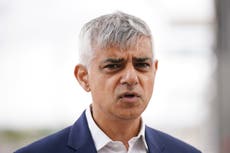Liz Truss and Kwasi Kwarteng have ‘fixed energy crisis’, claims minister
Treasury minister Chris Philp also points finger at Vladimir Putin for rising interest rates


Liz Truss and her chancellor Kwasi Kwarteng have “fixed this energy crisis”, a Treasury minister has claimed despite rising household bills and fears about long-term support for businesses.
Chris Philip, secretary to the Treasury, said the government had taken “decisive” action on the crisis with the £2,500 cap on annual average household energy bills over the next two years.
“He and the prime minister working together have fixed this energy crisis for families,” he told Sky News on Thursday.
Mr Philip added: “We would have had energy bills of £6,000 – they intervened to stop that … I think families up and down the country would be pleased because they’ve got a prime minister and a chancellor who have taken urgent, decisive action.”
The minister insisted that Ms Truss would not reverse her economic strategy and refused to for the current crisis – despite Mr Kwarteng’s mini-Budget sparking turmoil in the markets, as investors bet against the pound and dump government bonds.
Mr Philp appeared to blame Russia for rising interest rates, arguing that they were going up around the world “and that’s in response to the inflation, global inflation, caused by Putin’s illegal invasion of Ukraine”.
Labour has called for a recall of parliament, while some angry Tory MPs have suggested Ms Truss would have to sack Mr Kwarteng. Asked if the chancellor should quit, Mr Philp replied: “No, I don’t think he should.”
He added: “I’m not going to get into this post-facto raking over … I am certainly not going to apologise for having an energy intervention which is protecting every single household in this country.”
Amid fears of a major return to austerity, Mr Philp also confirmed that government departments have been asked to stick to existing spending limits – despite rising inflation – and be asked to make efficiency savings.
“The efficiency and prioritisation exercise is designed to firstly make absolutely sure we stick to those spending limits and secondly make sure that we are prioritising expenditure, not on anything that is wasteful,” the Treasury minister said.
TUC union leader Frances O’Grady told The Independent it would be an “act of national vandalism” if the government imposes austerity measures on the NHS and other public services to calm the turmoil.
Mr Philp argued on BBC Radio 4’s Today programme that “iron discipline” on public spending would not necessarily lead to austerity.
“If we can get economic growth going, which is our intention, it will lead to wages going up and lead to new and better jobs being created and will ultimately pay the taxes that fund public services like health, the NHS and so on,” he said.
The minister has also said the government may not hike benefits in line with the rising inflation. Previous chancellor Rishi Sunak had committed to uprate benefits based on September’s rate of inflation in April 2023.
Told by LBC host Nick Ferrari to “stop treating my listeners like fools” by trying to blame Russia for the current crisis, Mr Philp again denied the market turmoil was down to the mini-Budget. He claimed business groups had “strongly welcomed” the chancellor’s statement.
Meanwhile, business groups and fuel poverty campaigners have warned of pain with energy bills ahead, with the cap set to rise from Saturday, 1 October.
The government support package to cap energy bills from October will cost £60bn in the first six months alone, the chancellor announced last week.
The plan to cap average annual household energy bills at £2,500 over two years will cost £31bn in the first six-month period, and the plan to slash businesses’ bills in half for six months will cost around £29bn.
But the End Fuel Poverty Coalition – an umbrella group representing 60 charities – said the mini-Budget had “nothing” to offer in terms of more targeted support for the poorest.
Simon Francis, coalition co-ordinator, said Mr Kwarteng’s announcement had been “especially minimal on the support needed to keep people warm this winter”.
He warned energy bills were still set to increase by 64 per cent compared to last winter when the price cap finally rises this Saturday, 1 October.
Business chiefs said the government had not clarified what would happen to firms when support ends in March. “Six months support is not enough to make plans for the future,” said Shevaun Haviland, director general of the British Chambers of Commerce (BCC).
Meanwhile, London mayor Sadiq Khan has called on Ms Truss to give him the power to impose a rent freeze in London, arguing that it would put around £3,000 in the pockets of those facing rent rises and spiralling bills over the next two years.
City Hall figures shared with The Independent show that renters in the capital’s most poorly-insulated homes face paying a premium of almost £1,000.
Join our commenting forum
Join thought-provoking conversations, follow other Independent readers and see their replies
Comments



Bookmark popover
Removed from bookmarks